People in Switzerland will be able to legally change gender by a visit to the civil registry office from January 1, putting the country at the forefront of Europe’s gender self-identification movement.
Switzerland joins Ireland, Belgium, Portugal and Norway as one of the few countries on the continent that allow a person to legally change gender without hormone therapy, medical diagnosis or further evaluation or bureaucratic steps.
Under the new rules written into Switzerland’s civil code, anyone aged 16 and above who is not under legal guardianship will be able to adjust their gender and legal name by self-declaration at the civil registry office. Younger people and those under adult protection will require guardian consent.
This marks a change from the current set of regionally prescribed standards in Switzerland, which often require a certificate from a medical professional confirming an individual’s transgender identity.
Some cantons – semi-autonomous regions in federal Switzerland – also require a person to undergo hormone treatment or anatomical transition in order to legally change gender, while, for a name change, proof could be required that the new name has already been unofficially in use for several years.
Switzerland, long known as socially conservative in the main, voted in September to legalise civil marriage and the right to adopt children for same-sex couples, one of the last countries in Western Europe to do so.
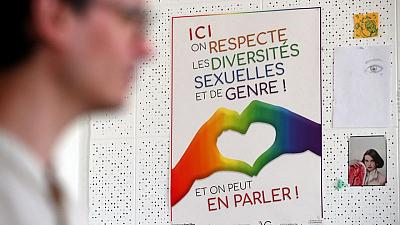
With the new gender change rules, Switzerland joins just two dozen countries worldwide aiming to decouple gender choice from medical procedures.
While some other European nations including Denmark, Greece and France have removed the requirement of medical procedures, including sex reassignment surgery, sterilisation or psychiatric evaluation, their rules require further steps or conditions.
Spain in June approved a draft bill allowing anyone over the age of 14 to change gender legally without a medical diagnosis or hormone therapy. Germany in 2018 became the first European government to introduce a third gender option but in June 2021 shot down two bills aiming to introduce gender self-identification. A new transgender member of parliament is hoping to address that.
The EU’s top court has ruled that same-sex parents and their children must be recognised as a family in all member states.
In a landmark ruling on Tuesday, the European Court of Justice (CJEU) said that if one country acknowledges a parental relationship with a child, then every member state should do the same in order to guarantee the child’s right to free movement.
The case came before the court after Bulgarian authorities refused to give a birth certificate to the new-born daughter of a same-sex couple on the basis that a child cannot have two mothers.
The Bulgarian woman challenged the decision and the case ended up at the ECJ, which examined whether the refusal to issue documents violated the right of the child as an EU citizen to move around the 27-nation bloc freely.
Bulgarian Kalina Ivanova and British Gibraltar-born Jane Jones are both registered as the mothers of Sara, who was born in Spain in 2019.
But neither parents are of Spanish descent, meaning citizenship in that country is not allowed and under the British Nationality Act of 1981, Jones cannot transfer British citizenship to her daughter as she was born in Gibraltar.
On this basis, Ivanova requested Bulgarian citizenship for her child, which was subsequently rejected since same-sex marriages and partnerships and not legally recognised in Bulgaria.
As a result, Sara was left at risk of statelessness, with no access to citizenship, unable to leave her family’s country of residence, Spain, as well as no personal documents, therefore, limiting her access to education, healthcare and social security.
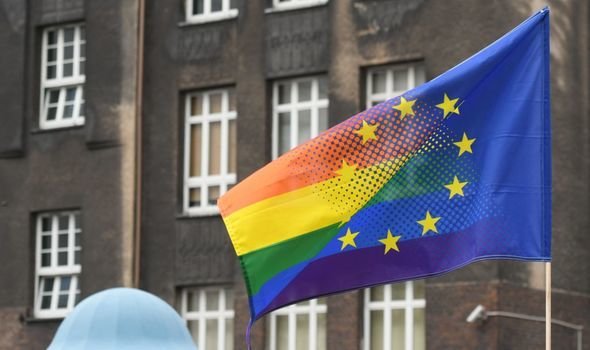
The CJEU also ruled that the child should be issued a Bulgarian passport.
Speaking on Tuesday following the ruling, Arpi Avetisyan, head of litigation at NGO ILGA-Europe said: “The judgment has brought long-awaited clarification that parenthood established in one EU Member State cannot be discarded by another, under the pretence of protecting the ‘national identity’.
“This is a true testament to the EU being a union of equality and we look forward to seeing rainbow families enjoying their right to freedom of movement and other fundamental rights on equal footing to anyone else. It is important that the judgment is implemented imminently, not only for baby Sara and her family, but also for other families facing similar struggles across the EU.”
The case cannot be appealed.
sources:
BUDAPEST – Hungary’s parliament passed a resolution on last Tuesday which will empower the government to hold a referendum on LGBTQ issues, raising Prime Minister Viktor Orban’s anti-LGBTQ campaign to a new level as he heads into a tough election race next year.
Orban, a nationalist who has been in power since 2010, this year proposed a referendum on ruling party legislation that limits schools’ teaching about homosexuality and transgender issues, stepping up a culture war with the European Union.
Facing his first competitive election in more than a decade, nationalist Orban has sought to promote social policies that he says safeguard Christian values against Western liberalism, putting gender issues and what he calls LGBTQ propaganda at the center of his campaign along with migration.
Parliament voted on four referendum questions one by one, passing them with Fidesz’s ruling majority.
“The Hungarian government proposes that citizens should have a chance to express their stance on the issues of gender propaganda,” deputy minister Balazs Orban told parliament.
“We are committed. We believe that we …have to say no to LGBTQ propaganda in schools carried out with the help of NGOs and media, without parental consent.”
He said holding the referendum on the same day as the parliamentary vote would save taxpayers money but it is up to President Janos Ader to set the date. Ader, an ally of the government, has not yet fixed a date for the parliamentary elections which are expected to be held in April.
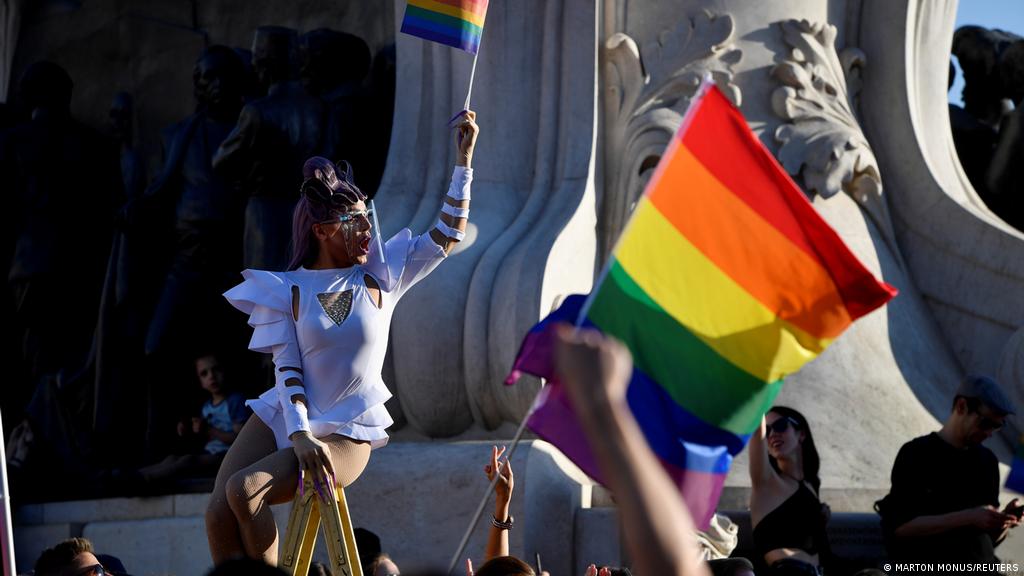
In the referendum, Hungarians will be asked whether they support the holding of sexual orientation workshops in schools without parents’ consent and whether they believe gender reassignment procedures should be promoted among children.
They will also be asked whether media content that could affect sexual orientation should be shown to children without any restrictions.
The law passed in June, which the government says aims to protect children, has caused anxiety in the LGBT community.
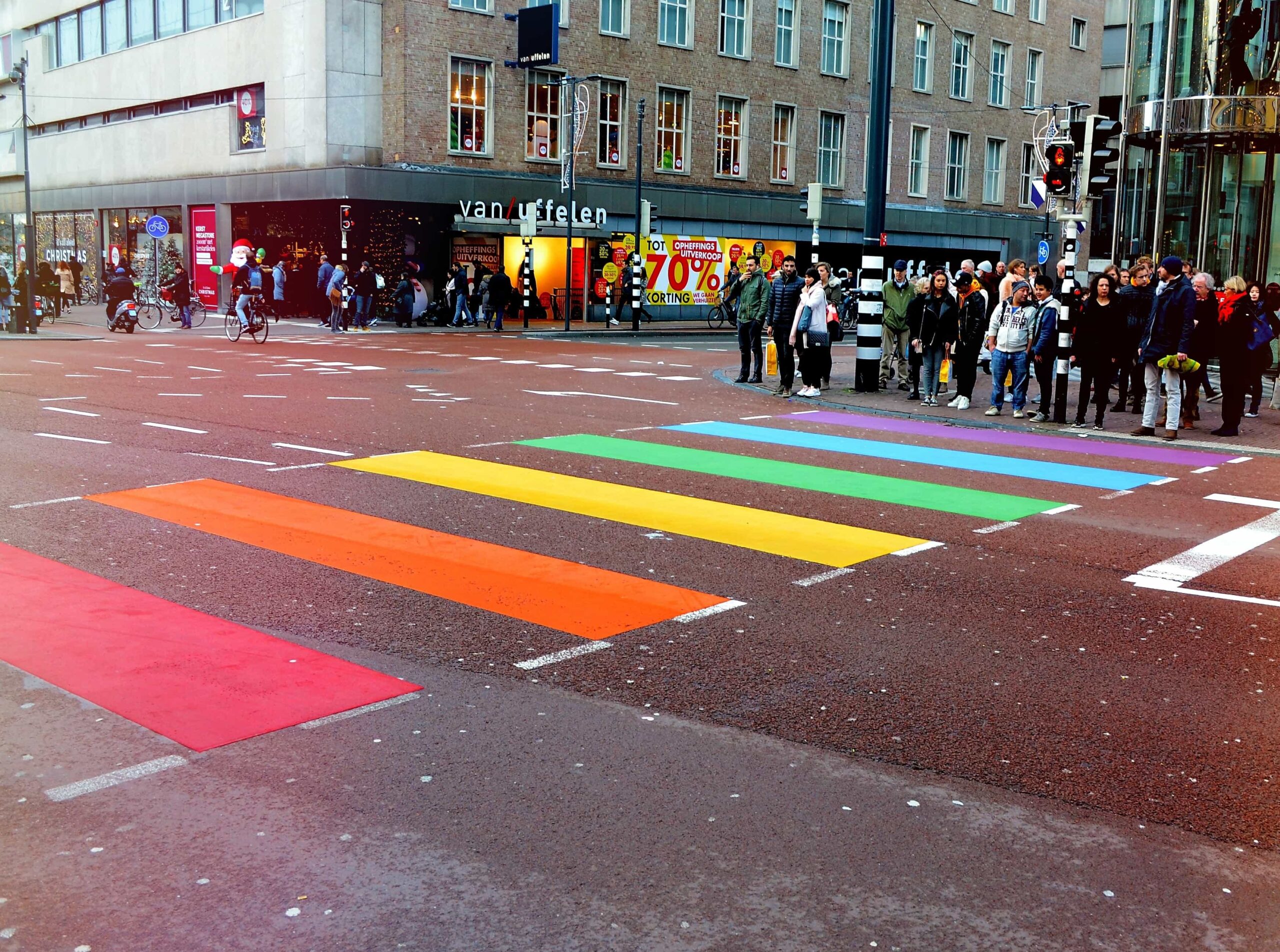
sources:
Enioluwa Adeoluwa, affectionately known as Lipgloss Boy or Beauty Boy, has become one of Nigeria’s most popular influencers. He has done so by challenging notions of masculinity in his videos, which offer makeup, skincare and fashion advice for men. Enioluwa’s success, in a country as conservative and homophobic as Nigeria, is impressive and unprecedented.
It all began when Enioluwa posted a video of himself on Instagram applying lip gloss in November 2020. The video quickly went viral. Today, Lipgloss Boy has over 335,000 followers on Instagram, more than 376,000 followers on TikTok, a late-night show, and he has worked with major international beauty companies.
The 22-year-old is currently completing a marketing masters degree in Lagos and also works as a content creator for a fintech company. He grew up with five siblings in a Christian family which he described as a “beauty experience”.
Enioluwa told us that he was grateful for how open-minded his family has been – a luxury in a traditionalist country like Nigeria.
Enioluwa told us he sometimes feels scared before posting his videos – and for good reason.

Nigeria’s legal code criminalizes homosexual acts and the gender identity or expression of trans people. In the north of the country where sharia law holds, penalties can include public flogging or stoning to death (although that penalty has not been used). In addition, members of the LGBTQ community have been beaten up in public. In other states, same-sex offences carry a 14-year jail term.
A 2013 Pew Research Center study found that 98 percent of Nigerians thought homosexuality should not be accepted by society. Meanwhile, a 2017 survey by The Initiative for Equal Rights (TIERS), a Nigerian-based human rights organisation, showed that 90 percent of Nigerians supported the continued enforcement of Nigeria’s anti-gay laws.
Enioluwa believes that there has been a generational change in the way social issues are dealt with, with younger generations becoming a lot more progressive. According to him, social media has played a key role in this shift.
Enioluwa’s work is not just important for men, but for women as well. According to a study by the UN, addressing the negative expectations of men, a feature of ‘toxic masculinity’, plays a key role in eradicating gender-based violence.
This is critical in Nigeria, where more than one out of every four women aged 25 to 29 have experienced some form of physical violence, according to the UN.
source:
https://observers.france24.com
Since the Taliban took control of Afghanistan at the end of August, the persecution of the country’s LGBT+ community has ramped up – forcing many to live in hiding, fearing for their lives. “We have received reports of names of suspected LGBTQI people circulating,” said the head of the Rainbow Railroad, a Canadian NGO helping under-threat Afghans to flee into exile.
According to reports, the Taliban has a “kill list” for the Afghan LGBT community. An NGO has reportedly said that the Taliban has been identifying LBTQI+ persons in the country.
The Islamist government’s extremist interpretation of Sharia law means homosexuality is strictly prohibited and prohibited by death – often in particularly brutal ways.
And now, the director of a LGBT+ human rights group has claimed that the Taliban have created a list of gay people who they want to kill.
‘This is a really scary time to be in Afghanistan,’ Kimahliu Powell, executive director of the Rainbow Railroad, the only international LGBT+ organisation on the ground in Afghanistan, told France 24.
‘We now know for sure the Taliban has a ‘kill list’ circulating, identifying LBTQI+ persons,’ he said.
Fears for the LGBTQ+ community in Afghanistan first emerged after the Taliban seized power in August.
Kimahliu said the Taliban is likely to have paid close attention to the names of people that foreign rights groups tried to evacuate in the weeks leading up to the withdrawal of US and allied troops from Afghanistan.

Kimahliu added that those who were unable to be evacuated had their identities were exposed so are likely to have been added to the Taliban’s ‘kill list’.
He claimed the Taliban used data leaks to add the names to their ‘kill list’ alongside ‘entrapment’ schemes as some gay people said they had received a mystery email from someone claiming to be connected with Rainbow Railroad asking for their information and passport.
Rainbow Railroad was founded in 2006 with the aim of helping at-risk LGBT+ people around the world flee violence and persecution in their homelands. In 2017, the group shot to worldwide fame after helping more than a hundred people escape persecution during the deadly anti-gay purge in Chechnya. In the past few months, however, most of its efforts has been focused on Afghanistan, where it is helping threatened members of the local LGBT+ community find temporary refuge in safe houses, after which it tries to bring them “by land or by air” to permanent safety abroad.
Powell described the current climate in Afghanistan as “lawless”, saying the general uncertainty and unpredictability of what Taliban rule entails for the population as a whole has even led to some people turning in family members for suspected LGBT+ activity.
“As I said, this is really scary times, and people are trying to curry favour with the Taliban,” he said. “I think everyone’s trying to navigate that environment, and so if they (the Taliban) have identified LGBTQ+ people as a target, there’s an incentive to turn them in.”
Powell said that this has left members of Afghanistan’s LGBT+ community even more vulnerable and isolated, since they can’t even count on the support and protection of their families. In the meantime, he said, they don’t have much choice but to hide.
“This has been the most complicated mission that we’ve done, and continues to be so.”

sources:
SOFIA – A far-right nationalist candidate in Bulgaria’s Nov. 14 presidential election was detained and charged with hooliganism and infliction of an injury over a weekend attack on an LGBTQ community center in Sofia, prosecutors said on Wednesday.
Boyan Rasate, a politician known for his strong anti-LGBTQ positions, has been detained for 72 hours, after his legal immunity as a presidential candidate was waived.
Rasate is a self-proclaimed national socialist who has referred to Hristo Lukov, a pro-Nazi Bulgarian World War II general, as a hero.
He has not admitted any guilt and has declined to make a statement, prosecutors said.
“The crimes committed stand out with their extreme audacity and disrespect for the democratic foundations of the state,” prosecutors said in a statement.
A group of about 10 people led by Rasate stormed the Rainbow Hub during a trans community event late on Saturday, hitting one employee in the face, and overturning stalls and tables, the Bilitis Foundation, which runs the center, said.
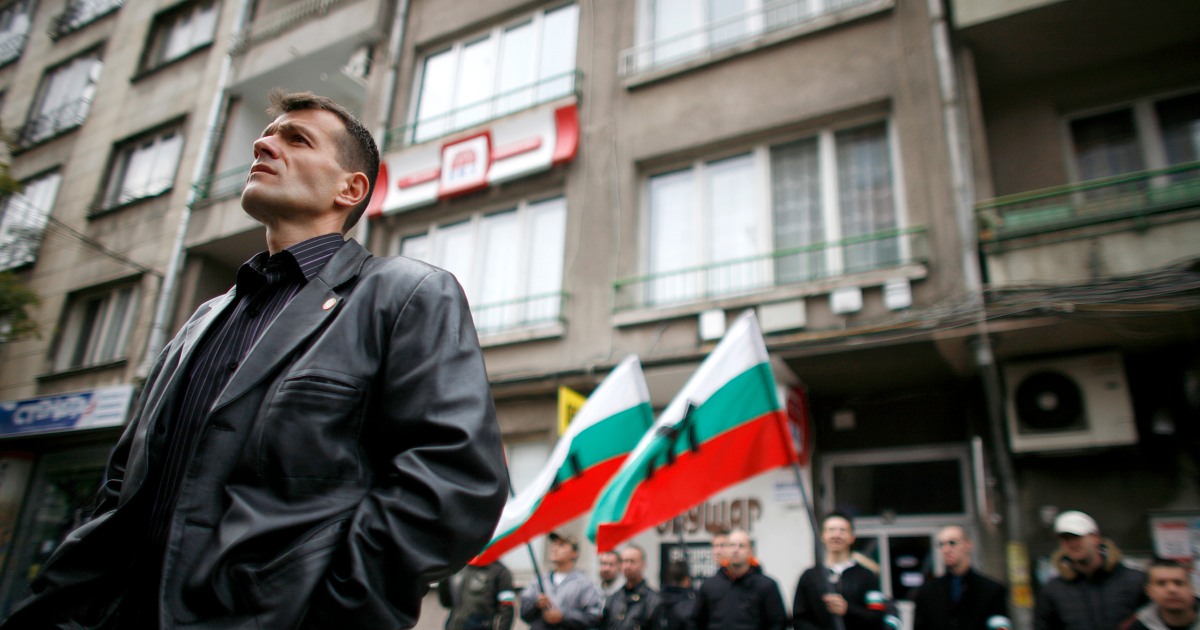
Gloriya Filipova, the foundation’s project coordinator, told Euronews that Rasate was one of a group of mostly men that stormed into the event after it had started.
“I tried to stop them. I started to scream ‘no’, I spread my arms and tried to stop them from entering the space,” Filipova said.
She says Rasate then punched her in the face.
“They entered and just spread around all the rooms and started to break everything,” she added. One person had a knife and used it to cut the tyres of a scooter parked inside, she said.
The incident came 10 days after the organisation filed a petition of more than 8,000 signatures demanding that anti-LGBTI hate crimes be recognised as such. The Rainbow Hub is a home for multiple organisations that promote the protection of LGBT+ rights.
An early prosecutor-general statement said that Rasate could not be found “at a permanent and current address, as well as at other addresses”. But a video later showed him being arrested outside Bulgaria’s national broadcaster after reportedly appearing on the network.
The attack has drawn criticism from Bulgaria’s leading political parties and was strongly condemned by 11 Western embassies to Sofia.
The ambassadors of the United States, Britain, France, Ireland, Denmark and the Netherlands among others have called the attack “senseless” and have visited the Rainbow Hub centre on Monday to show their solidarity.
The Council of Europe’s Commissioner for Human Rights Dunja Mijatovic said in a tweet that the attack constituted “another worrying example of mounting threats against NGOs working for equal rights for the LGBTI community”.
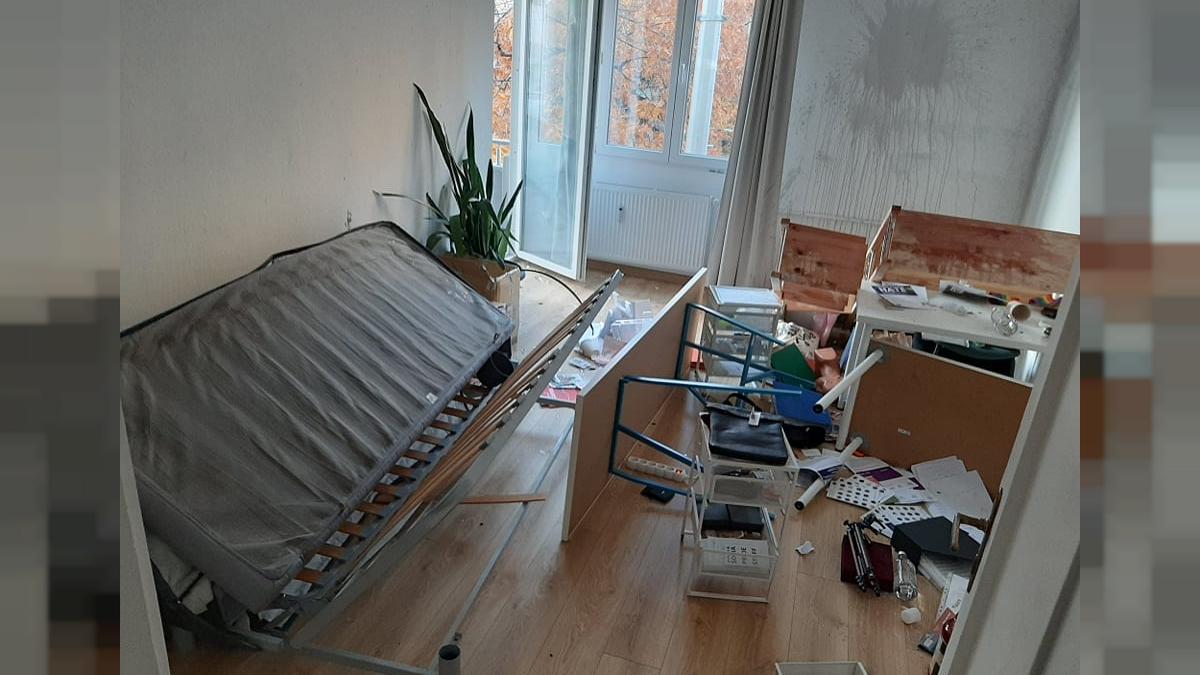
Rasate accused the US ambassador in Bulgaria, Herro Mustafa, of being behind the effort by prosecutors, referring to the statement from 11 embassies and referred to the LGBT community as “paedophiles”.
Filipova says that as a public LGBT+ activist, “you know you’re taking a risk” but that ahead of the presidential election, far-right parties have targeted minorities.
“We’ve been aiming to change the hate crime legislation for 19 years already, so I hope that this time the institutions will actually see that this is a serious problem and they need to change the legislation.
“We need to have more prevention measures because it is a big problem here,” she said.
Rasate, who was sentenced for violating public order during Sofia’s first gay parade in 2008, faces up to five years in jail if convicted.
Hate crime is not a separate criminal offense in Bulgaria. Crimes motivated by hate are being prosecuted as rioting in the south-eastern European country. Human rights organizations in the country are therefore calling for a change in legislation.
Bulgaria is one of the countries that have not signed the so-called Istanbul Convention. The Sofia government argues that such a move would pave the way for gay marriage to be legalized. Homophobia is widespread among the Bulgarian public. The presidential election in Bulgaria will take place on November 14th. Head of state Rumen Radew is applying for a second term.
sources:
Organizers of the ninth Montenegrin Pride on Saturday called on the improvement of the rights of the LGBT community and full implementation of Same-sex partnership Law.
Organized by NGO Qeer Montenegro, Montenegrin pride took place under the slogan, “Love people” [“Ljubav ljudi”], as the LGBT and civic activist as the Government and political parties officials walked in the capital, Podgorica. Waving rainbow flags and carrying banners, Montenegrin Pride participants passed the parliament, the government building and the city assembly.
“Everyone must contribute to building a Montenegrin society in which all communities are equal. We must never consent to homophobia, violence and hatred,” Danijel Kalezic, head of Queer Montenegro, an NGO, said.
The ninth Montenegrin Pride took held under COVID-19 health measures, so all participants had to present a vaccine certificate, a negative PCR test not older than 72 hours, or a negative antigen test not older than 48 hours, or confirmation of recovery from COVID not older than six months and not more recent than 14 days.
The march’s securitry was handled by police deployed in the centre of the capital, Podgorica. Several top government officials attended the event, including Deputy Prime Minister Dritan Abazovic, Foreign Minister Dordje Radulovic and Minister of Finance and Social Care Milojko Spajic.
Representatives of NGOs and the smallest partner in the ruling bloc, Black on White, also attended the march, as did Ivan Vukovic, Mayor of Podgorica, from the opposition Democratic Party of Socialists, DPS.
Organisers called on the LGBT community to use their right to register same-sex partnerships in Montenegro, and urged the government to regulate last year’s same-sex partnership law with the rest of the country’s legislative framework.
In 2020, Montenegro became the first non-EU Balkan state to legalize same-sex partnerships.
Under the law, same-sex couples can enter into a legal union at their local registry office. The law also regulates mutual financial support and division of joint property in event of divorce and grants the right to social security and health cover based on their partner.
The law does not allow same-sex couples to adopt or foster children.
Despite recent official supportive words, homosexuality remains a sensitive issue in the still socially conservative country, as it does elsewhere in the Balkans.
Earlier surveys have suggested that 71 percent of citizens in Montenegro still view homosexuality as an illness and that every second citizen sees it as a danger to society and would wish the state to suppress it.
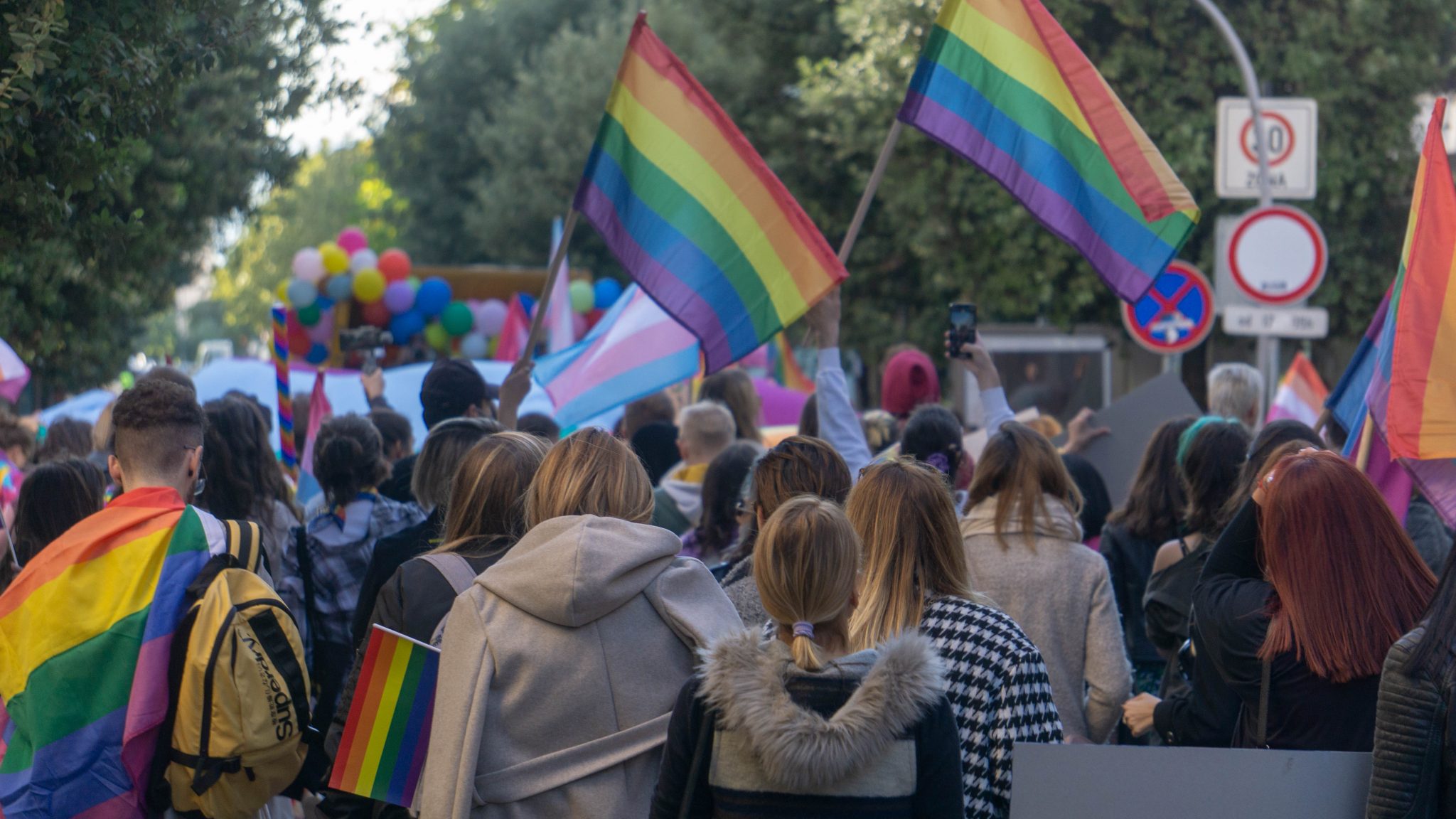
source:
The Netherlands was the world’s first country to legalise gay marriage in 2001, and now it is finally extending that right to the royal family.
The rules for members of the Dutch Royal family are changing to be more inclusive of possible LGBTQ heirs to the throne.
In a written answer to questions from parliamentarians, Prime Minister Mark Rutte wrote on Tuesday that “the Cabinet does not see that an heir or the King would have to abdicate the throne if he/she wished to marry a person of the same sex.”
The questions arose following the publication of a book over the summer on the heir to the throne, “Amalia, Duty Calls”.
The book did not speculate over the princess’s personal life, and there is no indication of any wedding in the pipeline.
Amalia has not made any comments on the matter, and little is known of her personal life.
Princess Amalia is the eldest child of King Willem-Alexander and will turn 18 on December 7. She graduated high school in June and announced she plans to take a gap year before attending university.
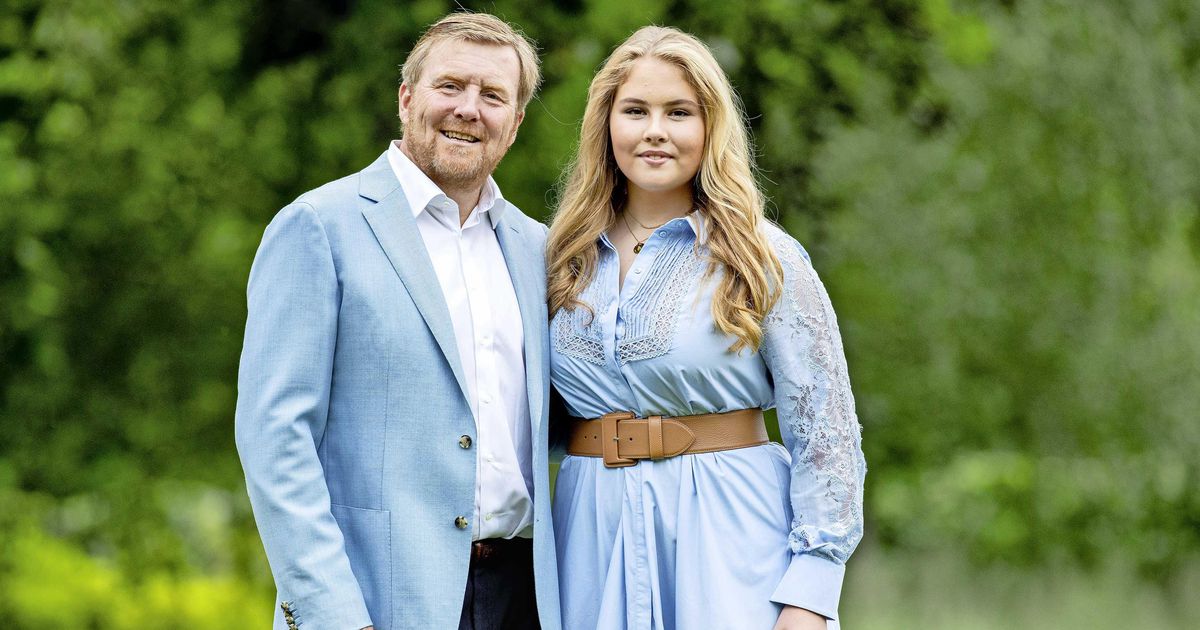
Heir to the Dutch throne Princess Amalia with her father, King Willem-Alexander
She has also turned down the €1.6 million annual allowance she was entitled to upon reaching 18, stating in a letter to Rutte earlier this year that she finds it “uncomfortable (to receive the money) as long as I do not do anything for it in return, and while other students have a much tougher time of it, particularly in this period of coronavirus.”
In his letter to parliamentarians, Rutte did not answer definitively on the question of succession in the case of a same-sex marriage on whether a child born following a sperm donation or via a surrogate mother can be named “legitimate heir.”
“It’s frightfully complicated,” Mr Rutte explained. The Dutch constitution states that the king or queen can only be succeeded by a “lawful descendant”.
The prime minister said that it was purely theoretical at this stage but it would be up to parliament, which has to give approval to a royal marriage. “Let’s cross that bridge if we come to it,” he told Dutch TV.
Modern family law offers much scope for civil life to establish or have established family law relationships,” Rutte wrote.
Royal marriages do need the approval of parliament, however, and members of the royal house have on occasion given up their place in the line of succession, either to marry someone without permission or because they seemed unlikely to obtain it.
Heirs to thrones in other countries have often hidden their sexuality in fear of being dethroned and disowned, but few have indeed come out.
Queen Elizabeth II’s cousin, Lord Ivar Mountbatten, was the first royal in British history to marry a partner of the same-sex in 2018. Prince Manvendra Singh Gohil was the first openly gay Indian royal when he came out in 2006, according to NBC News.
sources:
Two German politicians made history when they were elected to the country’s parliament last week. Tessa Ganserer and Nyke Slawik, both of the Greens party, are the first transgender women to win a parliamentary seat in Germany.
Tessa Ganserer and Nyke Slawik stood for the Greens party, which came third in the election, increasing its share of the vote to 14.8 percent from 8.9 percent in 2017 and is set to play a pivotal role in the building of a new three-way coalition government.
“It is a historic victory for the Greens, but also for the trans-emancipatory movement and for the entire queer community,” Ganserer told the Reuters news agency.
Ganserer has focused on fighting for equal rights for women, the LGTBQ community and disabled community. A mother of two, she hopes to make legislative changes to allow lesbian mothers to adopt children, according to Reuters.
Fellow Greens party candidate Slawik called the election results “madness.” “I still can’t quite believe it, but with this historic election result I will definitely be a member of the next Bundestag [parliament],” Slawik wrote on Instagram, sharing a shot of herself with a bouquet of flowers.
Slawik has focused on climate issues as well as equal rights and fair wages. She hopes that by 2030 Germany’s transportation will run on 100% renewable resources.
The number of transgender people holding political office is growing around the world — though it remains rare, especially at the highest levels of government.
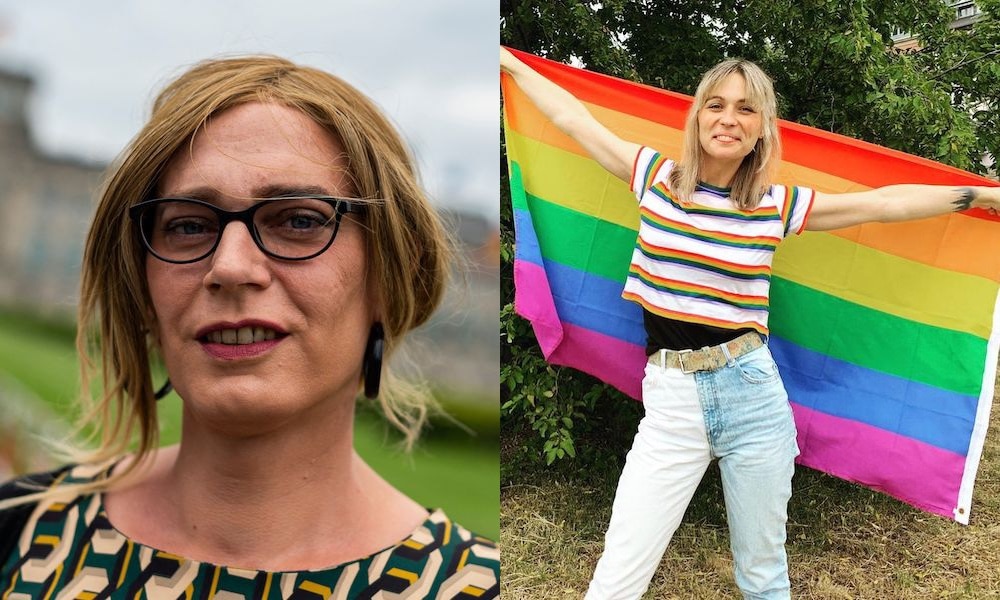
In the United States, the 2020 elections brought the total number of transgender elected officials from 28 to 32, according to NPR. Forty-two elected officials — mostly at the local level, with eight in state legislatures — openly identify as transgender, according to the Victory Institute, an organization that seeks to elevate openly LGBTQ leaders.
In Brazil — considered one of the most dangerous nations for LGBTQ people — more than 50 transgender candidates ran for state or federal office in 2018, according to the Associated Press. At the local level, the numbers are even greater: In 2020, 281 trans candidates ran for local offices in Brazil — up from 89 in 2016. A total of 30 transgender people won across the country, according to the Columbia Political Review.
In Uruguay, Michelle Suárez Bértora, a lawyer who played a key role in drafting the country’s same-sex marriage bill, became the nation’s first trans senator in 2014. In Venezuela, Tamara Adrián, a lawyer and activist, was elected to the National Assembly in 2015. And Brazil’s Erica Malunguinho was elected to São Paulo state’s legislature in 2018.
In Mexico, political parties have been required to nominate equal numbers of men and women since a 2019 constitutional reform mandated “parity in everything.” Newer rules also require the nomination of candidates from vulnerable groups, including the LGBTQ community.
In Asia, transgender political representation is similarly rare and largely local. There have been several openly transgender mayors in India, parliament members in Thailand and council members in Japan. In the mostly Roman Catholic Philippines, Geraldine Roman, an outspoken member of the transgender community, was elected to Congress in 2016. Roman has advocated for a bill prohibiting discrimination on the basis of sexual orientation or gender identity. The proposal has languished in Congress for more than two decades.
In Europe, Slawik and Ganserer are part of a small group of trans leaders on the national level.
Europe’s first openly transgender member of Parliament was Italy’s Vladimir Luxuria in 2006. Last year, Petra de Sutter was appointed Belgium’s deputy prime minister, making her the first openly transgender minister in Europe. Katrin Hugendubel, advocacy director for the LGBTQ rights organization ILGA-Europe, wrote in Politico that the lack of media frenzy around de Sutter’s appointment was a “sign of progress.”
Homosexuality was decriminalised in Germany in 1969 and same-sex marriage legalised in 2017. But hate crimes against LGBT+ people jumped by 36% last year, according to police figures that highlight a rising trend of homophobia in parts of German society.
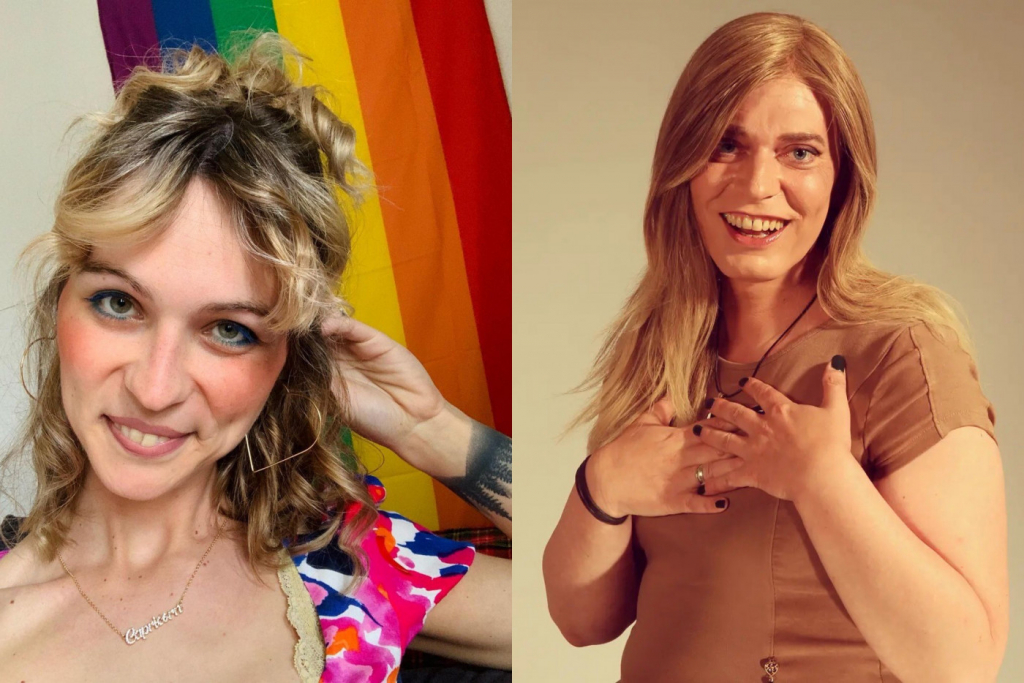
Source:
https://www.washingtonpost.com
https://www.cbsnews.com
https://www.nbcnews.com
https://www.reuters.com
Swiss voters overwhelmingly backed same-sex marriage in a referendum on Sunday, official results show.
The “Marriage For All” was adopted with 64.1% of votes in favour, according to the Federal office for Statistics, with none of Switzerland’s 26 cantons voting against it.
Justice Minister Karin Keller-Sutter tweeted that the government will implement the decision quickly and, under current plans, the new rules can take effect on July 1.
“We are very happy and relieved,” said Antonia Hauswirth of the national committee “Marriage for All”, adding supporters would celebrate in Switzerland’s capital Bern on Sunday.
Amnesty International said in a statement that opening civil marriage to same-sex couples was a “milestone for equality”.
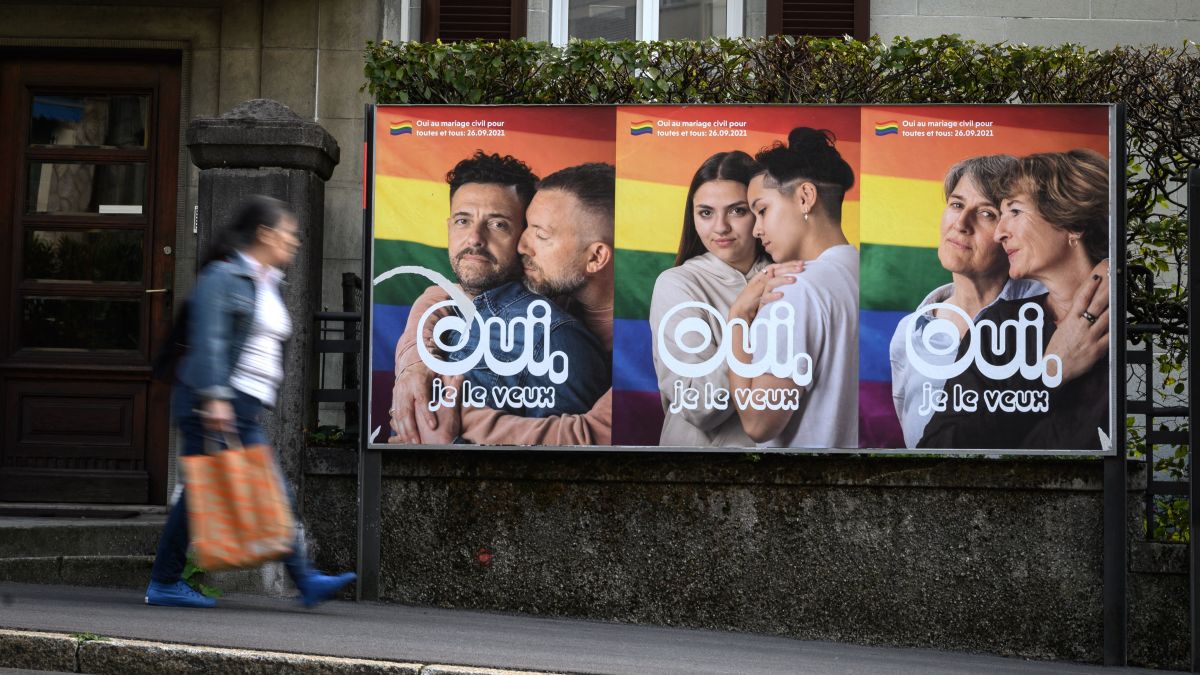
However, Monika Rueegger of Switzerland’s right-wing Swiss People’s Party (SVP) and member of the referendum committee “No to Marriage for All” said she was disappointed.
“This was not about love and feelings, it was about children’s welfare. Children and fathers are the losers here,” she told Reuters.
The amended law will make it possible for same-sex couples to get married, and to adopt children unrelated to them. Married lesbian couples will also be allowed to have children through sperm donation, currently legal only for married heterosexual couples.
It makes Switzerland the 30th country in the world to adopt same-sex marriage.
Justice Minister Karin Keller-Sutter said the first same-sex marriages would take place in July next year.
“Whoever loves each other and wants to get married will be able to do so, regardless of whether it is two men, two women, or a man and a woman,” she said.
The law will also make it easier for foreigners married to Swiss people to get citizenship.
A majority in all 26 cantons of the country of more than eight million people voted yes – even the most conservative ones. Support was strongest in Basel City at 74 percent.
“The Swiss have dropped a massive ‘yes’ into the ballot box,” Olga Baranova, a spokeswoman for the “yes” committee, told the AFP news agency.

Over the last 20 years, most countries in western Europe have recognised same-sex marriage. However, in Switzerland many big decisions go to a nationwide ballot, and this can slow down major changes to social legislation.
The new law, which had the backing of the Swiss government and all major political parties except the People’s Party, was passed by parliament in December.
However, it was then challenged by opponents, who gathered enough signatures to force a referendum.
sources: